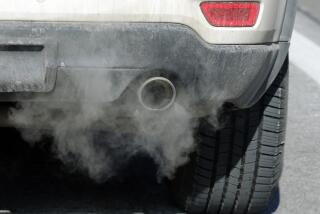Many Meters Lack Ethanol Certification
- Share via
Hundreds of measuring devices that are supposed to ensure that gasoline sold in California contains enough smog-reducing ethanol haven’t been certified by the state, raising questions about their ability to do the job, Los Angeles County inspectors say.
County officials are investigating. They say they haven’t determined whether the uncertified meters are causing harm by inaccurately measuring the amount of ethanol added to gasoline. Investigators say that contractors who installed the meters may not have been properly licensed and that they could face sanctions.
The meters are at oil company fuel terminals where tanker trucks are filled with gasoline for delivery to service stations and commercial customers. Recent inspections at six terminals found that all but one of the meters lacked the proper certification, said Jeff Humphreys, deputy director of Los Angeles County’s Weights and Measures Bureau, which plans to examine all terminals in the county.
The problem is “occurring all over the state,” Humphreys said. “We’re just the first ones to stumble on it.”
Absent state certification, it’s unclear whether the meters, some of which were installed only recently, are performing properly. Oil companies are phasing in ethanol to comply with a state requirement that gasoline be blended with that additive instead of methyl tertiary butyl ether, or MTBE, which has been blamed for contaminating groundwater.
Under state law, meters must undergo testing to certify that the devices are suitable and reliable for their intended use, Humphreys said.
Typically, manufacturers put their devices through a testing program administered by the National Conference on Weights and Measures, an organization of local, state and federal officials and industry representatives.
In California, the state Division of Measurement Standards is responsible for ensuring that measurement devices are properly certified, whether by adopting the national certification or through separate state tests.
The meters at issue went through the national certification program and were approved for measuring gasoline and diesel fuel at wholesale terminals. There was no separate testing by the state -- and Humphreys noted that the national certification doesn’t cover measuring ethanol.
State officials say they only recently became aware that the meters lacked certification for measuring ethanol.
Jay Van Rein, spokesman for the Division of Measurement Standards, said the agency is now working with the meter maker to certify the devices.
“Hopefully, this is just a formality,” Humphreys said of the process. But without that certification, he said, “we’re not certain that these meters are built for this type of use, and whether they will hold up or be accurate.”
In Los Angeles County, inspectors hit on the meter problem when they investigated complaints that an Exxon Mobil Corp. terminal in Vernon was sending some dealers loads that were short by 150 gallons to 200 gallons.
Inspectors found flaws in three of the terminal’s 12 devices for blending gasoline and ethanol, and shut those three systems down pending repairs and further testing.
It was at this time that they discovered the meters had not been certified.
Humphreys identified the uncertified meters his agency found in Los Angeles as part of the Smith Meter product line made by a unit of FMC Technologies Inc.
FMC spokesman Marvin Brown called the situation “pretty surprising.” He said the meters are accurate and that the company and state officials would begin testing next week to certify them for use with ethanol. Brown said state officials have described the situation as “essentially a housekeeping issue,” and he said he expects the meters to have ethanol certification by the end of the month.
There are about 60 major fuel terminals in the state, operated by companies including ChevronTexaco Corp., BP’s Arco division and Shell Oil Co. About 47 of the terminals are already blending ethanol with gasoline. State officials estimate that there could be as many as 12 ethanol meters at every site that blends the additive with the gas during loading.
Petro-Diamond Inc., which supplies gas stations and large commercial customers from its terminal in Long Beach, is among the companies that haven’t been inspected by the county. Company President James Keating said he didn’t know whether the terminal’s meters were certified but added that the blending “seems to work well.”
The FMC Smith meter is “very widely used,” said Dan Cummings, a spokesman for BP. “It’s approved for hydrocarbons but not for ethanol, apparently.”
Cummings said only one of the firm’s four Southern California distribution terminals uses the ethanol meters in question. He said the company’s other three sites don’t use that specific unit because the ethanol gets blended into the gasoline in large tanks instead of into each batch of gasoline as it’s pumped into tankers.
Last month, a miscue resulted in ethanol being left out entirely from 420,000 gallons of regular gasoline distributed from Arco’s terminal in San Diego.
The company had to retrieve the fuel from 59 stations and re-blend it, leaving some stations without regular-grade gas for a few days.
More to Read
Sign up for Essential California
The most important California stories and recommendations in your inbox every morning.
You may occasionally receive promotional content from the Los Angeles Times.













